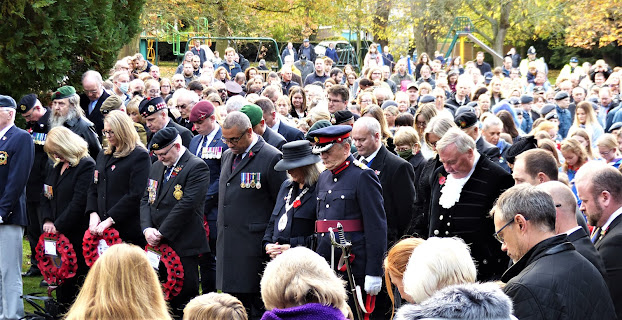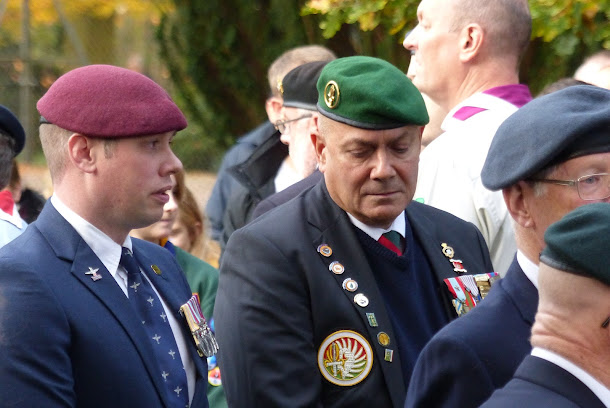At two in the almost sunny Sunday afternoon the congregation gathered to pay their respects to the war dead. Amongst them were many men, and a few women, who endured active service and saw their colleagues and friends suffer and sometimes die in action.
Before 1914 the wars Britain became involved in were far from home. Colonial wars, Crimea, South Africa, and early in the 19th century fighting Napoleon in Portugal and Spain, before the end at Waterloo. The public were not concerned much apart from the shortage of some goods, such as Brandy during Napoleon's time, and anyway smuggling was popular. Soldiers travelled the world, fought and died far from home, as sailors had done for generations. The public were involved only at a distance.
For many years people had realised war with Germany was likely. Patriotism was at a high, even though History was badly taught, and the wide spread of newspapers, from which most people were informed, were at best propaganda, and at worst deliberately false.
Being a soldier was a respectable occupation. Since the middle of the 19th century the military mind affected all parts of society, so much so that William Booth's outreach in the east end of London took the name 'Salvation Army,' and not long afterwards the copycats at the Anglican church joined in with the 'Church Army.'
The army had been reformed under the Haldane reorganisation, led by General Haig. Now we had 25 Front Line regiments, of two battalions each. One was stationed at home, the other abroad. Also the various militia were reformed into the Territorial Force, ostensibly for Home Defence only. These did however, allow men to play soldiers, learn the basics of warfare, and, in a time of few holidays, gave them suitable exercise at weekends and on general annual manoeuvres. With a possible war looming did some men enlist in the Territorials in preparation for this?
As any General knows, you plan for a war, prepare carefully, train your men, and off you go, and watch your plan disintegrate in the resulting stramash. All things change once war is entered upon. The UK found this to be true in 1914. British opinion was led to expect a short war, a few months only they said. This was considered likely elsewhere, even the Kaiser believed his men would be home by Christmas. It was easy to forget that the Boer War, such a short time before, had taken some four years before it ended. How dismayed were the politicians at the first war Cabinet meeting when Field Marshall Kitchener informed them the war would take at least three years and he must raise another hundred thousand men. They did not believe him! The Generals understood what could happen if a war of movement was halted, no politician appears to have considered this a possibility. Nonetheless, when war was declared on August 4th men everywhere rushed to the colours, many afraid they would miss the excitement.
Come November 1918 opinions differed somewhat from the days of early excitement. The surviving men who volunteered then were not the same men in 1918. The world had changed, the war had been won, something people often forget, but at a great cost, both 'at the front,' and 'at home.'The most reliable figures I have come across tell me that 704,803 men died in action. Of these some 338,955 are as yet undiscovered or unidentified. It is from this great loss that 'remembrance' as we know it springs.
The question "What to do with the bodies," caused much wringing of hands and cursing throughout the land. Some people, at least those with money, broke the law and brought back their own loved ones, their 'heroes,' rather than follow the final decision to bury men where they fell. Outrage abundant. Bodies were collected, I think those doing the job, many soldiers themselves or often Chinese labourers, were paid six shillings a d ay for the often gruesome work. Scattered bodies, small cemeteries, were collected together in large organised places near where they fell. These today, run by the Commonwealth War Graves Commission, are peaceful well tended resting places revealing nothing of the conflict that caused their creation. In the UK however, many did not have a place in which to commemorate their dead. So by the middle of the 1920s local war memorials sprang up everywhere. Large cities and towns created often huge memorials, local towns and villages did their best, even if it was just a plaque in a church. On these were graven the names of the dead, alongside slogans such as 'Our Glorious Dead,' 'Not Forgotten,' 'They Died so we could be Free,' and the names of battlefields they fought over, 'Mons, Ypres, Loos, Somme, Cambrai, Passchendaele.' A glance at such memorials tells much about the town or village where they are found, and the great cost to the population of the time.
The return and burial in Westminster Cathedral of the 'Unknown Warrior' in 1920 was much heralded by many. Women especially believed, some through dreams and visions, that this was their husband, son, brother. Thousands lined the streets as he was paraded through the city.At the same time a Cenotaph, made from wood, was erected in Whitehall. The empty tomb lying at the top symbolising the missing. This idea, copied from the ancient Greek fashion, was highly popular and within a year a more solid cenotaph, made I think of Portland Stone, was erected.
As the memorials closer to home began to appear in city, town and village, the locals turned out to 'remember' their was dead. Many an Honour Guard on duty at the opening or remembrance ceremonies could well remember and speak of the situation of those named on the memorial. Often not willing to discuss this publicly in front of the families. Many names were of course their brothers.
Occasionally in the following years some were able to travel to distant parts to stand alongside their dead. The majority however, were struggling to survive themselves without the 'Homes made for heroes,' that had been promised. Thousands of ex-servicemen, especially the wounded, were more or less abandoned to their fate.
The wives, mothers, children of the dead, and possibly those who so eagerly encouraged enlistment in their locale, now had a place where they could annually remember the sacrifice of their own. An event continued until their own passing.
Flanders Fields are at the right time ablaze with red poppies. During the 1920s the idea began in Canada to commemorate the war dead by the wearing of a red poppy each year. The idea carried on and now is controlled by the 'British Legion,' (In Scotland 'Poppy Scotland.') and is used to raise money to support their work with wounded servicemen. It remains highly popular, and while some refuse to wear them, others have designed white, blue or black, poppies for reasons of their own, the Poppy is worn by the majority of the population during the two weeks up to the Remembrance Day on November 11th. It is something of a shame that it has been highjacked by many for reasons of their own. Some consider it encourages or supports war, others, mostly the English Brexit fraternity have taken to it in a big way. This is not to commemorate or remember, for them it reflects a historic past in which 'England' (not Britain) ruled the world. A society that has seen Irish independence, Scots nearing independence and has nothing of note within itself bar a failed Brexit, desperately uses anything, the poppy included, to give meaning to their lives.

There are questions these days regarding the meaning of remembrance. Many voices are heard today claiming 'it was so long ago,' and people who served are now dying off. "What is the point?" Such people need to understand how History affects them today as they themselves are a product of these two great conflagrations that rocked the world. As it is, in the crowd gathered at this memorial were many who knew an uncle or father who left to join the war in the 1940s. Others have researched their family tree to find out more about grandad or great grandad and his war record. Relatives of the dead still gather, remembering stories told by aunts and uncles re the one who did not return. In spite of the time people still remember. Indeed, since 2014 many more have taken thought to the war dead, and more so when they have relatives who have served, and sometimes died, in one of the UKs more recent actions, Iraq, Afghanistan, or at the 40th centenary of the Falklands Conflict. The war dead are not just dead in the (to some) distant past, they are family and friends of many gathered at memorials on Sunday. The two world wars affected each of us living today, at least indirectly, the lesser wars, which will continue until the next global one, affect many of us daily. We would be foolish to forget those we have lost.




.jpg)


















































